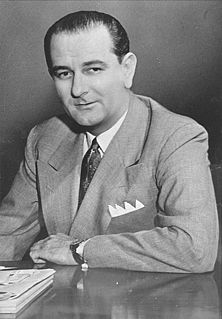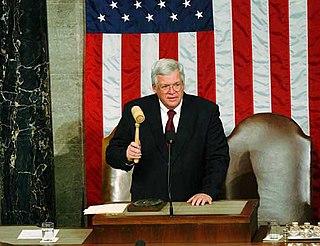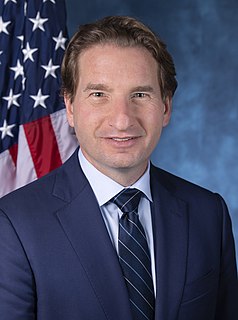
The Ninety-fifth United States Congress was a meeting of the legislative branch of the United States federal government, composed of the United States Senate and the United States House of Representatives. It met in Washington, DC from January 3, 1977, to January 3, 1979, during the final weeks of the administration of U.S. President Gerald Ford and the first two years of the administration of U.S. President Jimmy Carter.
Jim Elliott is the current Chairman of the Montana Democratic Party and a former member of the Montana Senate, representing District 7 from 2001 to 2009. Before that he was a member of the Montana House of Representatives from 1989 through 1997, representing District 72.

The 1954 United States Senate elections was a midterm election in the first term of Dwight D. Eisenhower's presidency. Eisenhower's Republican party lost a net of two seats to the Democratic opposition. This small change was just enough to give Democrats control of the chamber with the support of an Independent who caucused with them.

The Montana House of Representatives is, with the Montana Senate, one of the two houses of the Montana Legislature. Composed of 100 members, the House elects its leadership every two years.

The Eighty-seventh United States Congress was a meeting of the legislative branch of the United States federal government, composed of the United States Senate and the United States House of Representatives. It met in Washington, D.C. from January 3, 1961, to January 3, 1963, during the final weeks of the administration of U.S. President Dwight D. Eisenhower and the first two years of the administration of U.S. President John Kennedy. The apportionment of seats in the House of Representatives was based on the Seventeenth Census of the United States in 1950, along with 2 seats temporarily added in 1959. Both chambers had a Democratic majority.

Raymond Jon Tester is an American politician serving as the senior United States Senator from Montana, a seat he was first elected to in 2006. He is a member of the Democratic Party. Tester was first elected to the Senate in 2006, defeating Republican incumbent Conrad Burns in one of the closest Senate races of that year. He narrowly won reelection in 2012 against U.S. Representative Denny Rehberg, and in 2018 against Montana State Auditor Matt Rosendale. Tester was previously the president of the Montana Senate and worked as a music teacher and farmer. He became Montana's senior senator in 2014 following Max Baucus's departure and is the dean of Montana's congressional delegation.

The Eighty-eighth United States Congress was a meeting of the legislative branch of the United States federal government, composed of the United States Senate and the United States House of Representatives. It met in Washington, D.C. from January 3, 1963, to January 3, 1965, during the last year of the administration of U.S. President John F. Kennedy, and the first of the administration of his successor, U.S. President Lyndon B. Johnson. The apportionment of seats in this House of Representatives was based on the Eighteenth Census of the United States in 1960, and the number of members was again 435. Both chambers had a Democratic majority.

The Eighty-sixth United States Congress was a meeting of the legislative branch of the United States federal government, composed of the United States Senate and the United States House of Representatives. It met in Washington, D.C. from January 3, 1959, to January 3, 1961, during the last two years of the presidency of Dwight D. Eisenhower. The apportionment of seats in the House of Representatives was based on the Seventeenth Census of the United States in 1950. Both chambers had a Democratic majority. When Alaska and Hawaii were admitted as states in 1959, the membership of the House temporarily increased to 437 ; it would remain at 437 until reapportionment resulting from the 1960 census.

The One Hundred Ninth United States Congress was a meeting of the legislative branch of the United States federal government, composed of the United States Senate and the United States House of Representatives, from January 3, 2005 to January 3, 2007, during the fifth and sixth years of George W. Bush's presidency. House members were elected in the 2004 elections on November 2, 2004. Senators were elected in three classes in the 2000 elections on November 7, 2000, 2002 elections on November 5, 2002, or 2004 elections on November 2, 2004. The apportionment of seats in the House of Representatives was based on the Twenty-second Census of the United States in 2000. Both chambers had a Republican majority, the same party as President Bush.
Anna Holliday "Holly" Benson was a member of the Florida House of Representatives. In November 2000, Benson became the first Republican elected to the District 3 seat, succeeding Democrat DeeDee Ritchie. On December 28, 2006, Florida's Governor-elect Charlie Crist appointed Benson to the position of Secretary of the Florida Department of Business and Professional Regulation. On December 31, 2006, Benson resigned from the Florida House of Representatives, ending her legislative service to the State of Florida. In February, 2008, Florida Governor Charlie Crist appointed Benson to the position of Secretary of the Florida Agency for Health Care Administration.
Bradley L. Dee is an American politician from Utah. He was a Republican member of the Utah State House, representing the state's 11th house district in Ogden from January 2003 through January 2017. He retired from office after choosing not to seek re-election in 2016.

Bryce Edgmon is Speaker of the Alaska House of Representatives, representing the 37th District since 2006. After his party won 17 seats in 2016, 2 Independents and 3 moderate Republicans decided to caucus with the Democrats, elevating him to Speaker. He is the first Alaskan Native in the history of the state to hold the position.

Michael R. Cooney is an American administrator and Democratic Party politician, who has served as the 36th Lieutenant Governor of Montana since January 2016. He previously served in the Montana House of Representatives (1977–1981), as the Secretary of State of Montana (1989–2001), in the Montana Senate (2003–2011), as the President of the Montana Senate (2007–2009) and ran unsuccessfully for Governor of Montana in 2000.
Kendall J. Van Dyk is a Democratic Party member of the Montana Senate, representing District 25 in north-central Billings, Montana since 2011.
Jon C. Sesso is an American politician of the Democratic Party. He is currently the Minority Leader of the Montana Senate, representing District 37 and has been since 2013. He was previously a member of the Montana House of Representatives, representing District 76, from 2004 to 2013.
Franke Wilmer is an academic and a politician in the Democratic Party She was a member of the Montana House of Representatives, representing Districts 63 and 64 from 2007–2013. Before first running for office in 2006, Wilmer was appointed to chair the Montana Human Rights Commission by Governor Schweitzer in 2005. She received both a PhD and Masters from the University of Maryland in 1990 and is currently a full professor of Political Science at Montana State University.
Tom L. Burnett is a Republican Party representative in the Montana House of Representatives, representing District 67 since 2014. After an unsuccessful attempt in 2008, he was elected in 2010 to represent District 63. He was unsuccessful in being reelected to District 63 in 2012.
Steven J. Fitzpatrick is an American politician of the Republican in the Montana Senate. Before being elected to the Senate, Fitzpatrick served in the Montana House of Representatives for the 20th district from 2011 to 2017.
Donna Bullock is a Democratic member of the Pennsylvania House of Representatives representing the 195th House district in Philadelphia, Pennsylvania.

Dean Benson Phillips is an American businessman and politician from the state of Minnesota. A Democrat, he is the member of the US House of Representatives from Minnesota's 3rd congressional district, having defeated Republican incumbent Erik Paulsen in the 2018 midterm election. The district is located in the western portion of the Twin Cities metropolitan area and includes Bloomington, Eden Prairie, Edina, Minnetonka, Maple Grove, Plymouth and Wayzata.